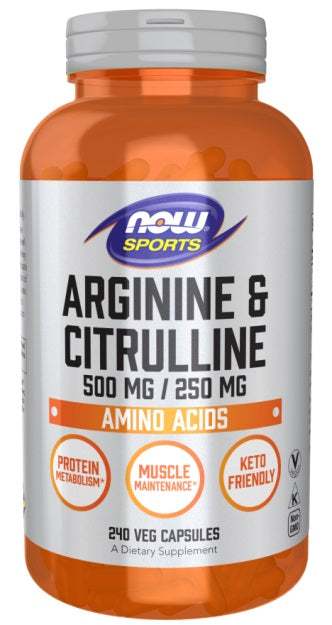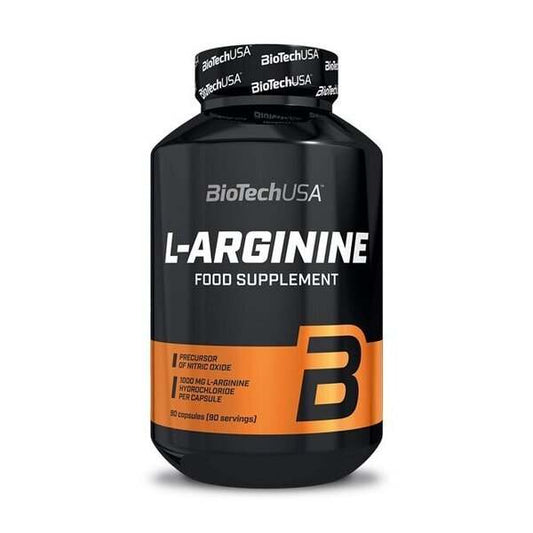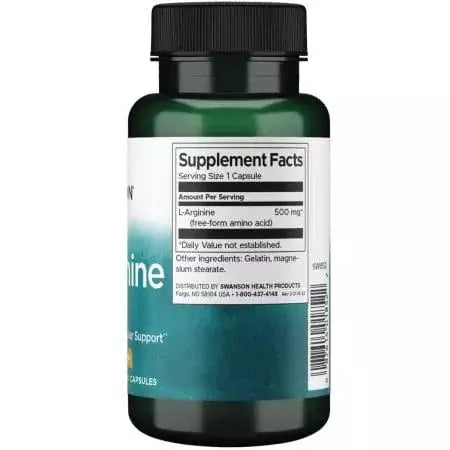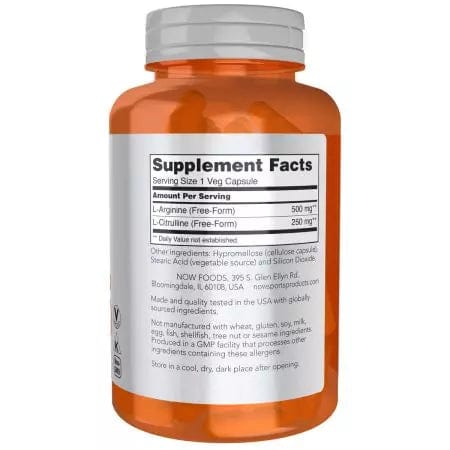Arginine Supplements
Arginine supplements are dietary amino acid products that provide L-arginine — a building block your body uses to support normal blood flow, exercise performance and nitric oxide production.
What is Arginine?
L-arginine is a semi-essential amino acid that plays a role in the body’s production of nitric oxide, a compound that helps relax blood vessels and support healthy circulation. It is also involved in protein synthesis and metabolic processes. While small amounts of L-arginine are found in foods like meat, dairy, nuts and seeds, supplementation is a common way to achieve higher doses that some people use for specific wellbeing goals.
Arginine supplements are often taken alongside broader routines such as heart health supplements, general amino acid support within multivitamins, or exercise-focused plans involving weight management concepts.
Benefits and Features of the Welzo Arginine Collection
-
Circulation support: L-arginine helps make nitric oxide, which supports healthy blood vessel relaxation and blood flow mechanisms.
-
Exercise performance: many users take Arginine before workouts as part of pre-exercise motivation and performance routines.
-
Metabolic support: arginine contributes to protein metabolism and cellular processes important for recovery and everyday wellbeing.
-
Flexible formats: available in capsules, tablets and powder to suit your preferred routine style.
-
Routine compatibility: pairs naturally with lifestyle categories such as heart health supplements and foundational nutrition strategies.
Why is Arginine Important?
Arginine plays a multifaceted role in the body. Its involvement in nitric oxide production makes it relevant to cardiovascular comfort and healthy circulation — factors that are important for people with active lifestyles or those looking to support everyday performance. Additionally, arginine’s participation in protein metabolism links it to recovery and muscle health, often explored alongside structured activity programmes and targeted nutrition.
Best Products in Arginine
Customers often choose arginine products that clearly state the L-arginine dose per serving and come from reputable brands. Common formats include pure arginine powders and capsules with complementary ingredients.
-
Pure L-arginine capsules: straightforward dose and ease of use.
-
Arginine powder with scoop: flexible dosing and mixability with water or pre-workout blends.
-
Combination formulas: arginine paired with other amino acids or supportive nutrients (e.g., citrulline).
How to Use Arginine?
- Follow the recommended dosage on the product label — strengths vary between brands.
- Arginine is often taken on an empty stomach or before exercise to support circulation and performance goals.
- Always stay hydrated and maintain balanced nutrition alongside supplementation.
- If you are using arginine in combination with other exercise-focused supplements, read labels carefully to prevent excessive amino acid intake.
Are there any side effects or interactions of Arginine?
Arginine supplements are generally well tolerated when used as directed, but mild side effects can occur.
-
Stomach discomfort: nausea, diarrhoea or bloating in sensitive individuals.
-
Blood pressure changes: because arginine influences nitric oxide and blood vessel relaxation, individuals taking blood-pressure-lowering medication should consult a clinician.
-
Herbal and supplement interactions: arginine may interact with other circulatory support products — discuss with a healthcare professional if you use multiple supplements.
If you are pregnant, breastfeeding, taking medication or have a medical condition (especially related to cardiovascular health), speak to a clinician before starting arginine supplementation.
What Are the Different Types of Arginine Available?
- Standard arginine capsules.
- Arginine powder with mixing scoop.
- Combination formulas (e.g., arginine with citrulline or other amino acids).
- Vegan-friendly arginine products.
What Are the Most Popular Arginine Products Available?
The most popular products typically include pure L-arginine capsules with clear dosing, arginine powders for flexible intake, and blends with complementary amino acids for exercise-focused support.
Statistics, Research, Expert Information and Quotes on Arginine
Arginine’s role in nitric oxide production has made it one of the most studied amino acids in circulation and performance research. While research continues to evolve, arginine’s functional role as a precursor to nitric oxide is well established and supports its popularity in wellness and exercise contexts.
“Arginine contributes to nitric oxide production, which supports healthy vascular function and circulation — a core mechanism explored in nutritional and exercise science.”
How We Select Our Arginine Collection on Welzo
-
Clear ingredient labelling: products that clearly state L-arginine dose per serving.
-
Quality standards: selection from reputable manufacturers with transparent production practices.
-
Routine compatibility: choices that integrate well with lifestyle categories such as heart health supplements and daily nutrition support.
-
Responsible messaging: products presented with clear context rather than exaggerated promises.
Trusted by Experts and Verified Arginine Quality on Welzo
Customer Reviews
See what Welzo customers are saying about our service and products:
Welzo Reviews
FAQs
What is arginine used for?
Arginine is often used as a supplement to support nitric oxide production, healthy circulation and exercise performance in adults.
How do I take arginine supplements?
Follow the label instructions. Arginine is commonly taken before training or at consistent times daily for circulation support — depending on the product.
Can arginine improve exercise performance?
Because arginine contributes to nitric oxide production and blood flow support, some people include it in pre-exercise routines, but results vary by individual.
Are there side effects of arginine?
Some people may experience mild digestive discomfort. If you experience severe symptoms, stop use and seek medical advice.
Can I take arginine with other supplements?
Yes — arginine can be taken with other nutrition supplements, but ensure total amino acid intake is balanced and check for interactions.
Is arginine safe for long-term use?
Arginine is generally well tolerated, but long-term use should be discussed with a healthcare professional if you have underlying medical conditions.
Can arginine affect blood pressure?
Arginine supports mechanisms linked to blood vessel relaxation; if you have blood pressure concerns or take blood pressure medication, speak to a clinician first.
Is arginine suitable for vegans?
Many arginine supplements are suitable for vegans, but check the product label for capsule materials.
Can I take arginine if I am pregnant?
Always consult a healthcare professional before taking any supplement during pregnancy or breastfeeding.
Where can I buy arginine online?
You can buy arginine supplements online at Welzo, with secure checkout and UK delivery.

























 Rated Excellent by 26,523+ Reviews
Rated Excellent by 26,523+ Reviews